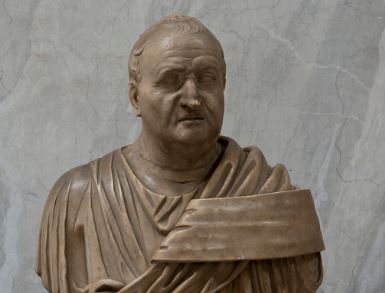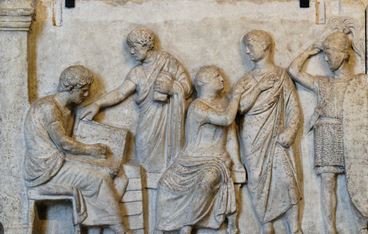The name “Ahenobarbus” is associated with several notable figures in ancient Roman history, primarily members of the Domitii Ahenobarbi family, a prominent and influential patrician family. The most renowned individuals bearing this name include Gnaeus Domitius Ahenobarbus and Lucius Domitius Ahenobarbus. Their lives and legacies provide valuable insights into the political and social dynamics of the Roman Republic and early Roman Empire.
The Domitii Ahenobarbi Family
The Domitii Ahenobarbi family was one of the leading aristocratic families in Rome. The name “Ahenobarbus,” which means “bronze beard” in Latin, suggests a traditional and prestigious lineage. Members of this family were known for their political influence, military achievements, and significant roles in Roman history.
Gnaeus Domitius Ahenobarbus (Consul 32 BCE)
Gnaeus Domitius Ahenobarbus, the earliest prominent member of the family, was a Roman politician and military leader. He served as consul in 32 BCE, a period marked by intense political and military strife as Rome transitioned from a Republic to an Empire.
Gnaeus was a supporter of the Republican cause and opposed the rise of Augustus (then Octavian). His career was marked by his involvement in the political and military struggles of his time, reflecting the broader conflicts and changes occurring in Rome during the late Republic.

Lucius Domitius Ahenobarbus (Father of Nero)
Lucius Domitius Ahenobarbus, also known as Gnaeus Domitius Ahenobarbus, was the son of the earlier Gnaeus Domitius Ahenobarbus and is perhaps the most famous member of the family due to his connection with the Roman emperors.
Early Life and Marriage
Lucius was born into a prominent Roman family and became a significant figure due to his marriage to Agrippina the Younger, a powerful woman who would later become the mother of Emperor Nero. This marriage solidified his position within the elite circles of Roman society.
Role in the Roman Empire
Lucius Domitius Ahenobarbus played a crucial role in the political landscape of Rome. His marriage to Agrippina was a strategic alliance that significantly influenced the future of the Roman Empire. Their son, Nero, would later become one of Rome’s most notorious emperors.
Lucius’s career was marked by his military and political activities. His influence was seen in his support for various political factions and his involvement in the intricate power dynamics of the Roman Empire. His life was a reflection of the shifting alliances and power struggles that characterized the Julio-Claudian dynasty.
Legacy and Historical Impact
The legacy of the Ahenobarbus family is intertwined with the broader narrative of Roman history. Their prominence in politics and military affairs reflects the complexities of Roman society during a time of significant transformation.
Influence on Roman Politics
The Ahenobarbus family’s influence was considerable, especially through their connections with the Julio-Claudian dynasty. Lucius Domitius Ahenobarbus, as the father of Emperor Nero, played a pivotal role in shaping the early years of Nero’s reign. The political maneuvering and alliances formed by the Ahenobarbus family contributed to the broader dynamics of Roman imperial politics.
Cultural and Historical Significance
The historical figures of the Ahenobarbus family are remembered for their contributions to the political and military history of Rome. Their roles in the transition from Republic to Empire and their connections with key historical figures like Augustus and Nero underscore their importance in Roman history.
The Ahenobarbus family, particularly Gnaeus Domitius Ahenobarbus and Lucius Domitius Ahenobarbus, played significant roles in the political and military affairs of ancient Rome. Their contributions and connections with influential figures in Roman history provide valuable insights into the complexities of Roman society during a time of significant change. Understanding the lives and legacies of the Ahenobarbus family members helps to illuminate the broader historical context of Rome’s transition from a Republic to an Empire.




